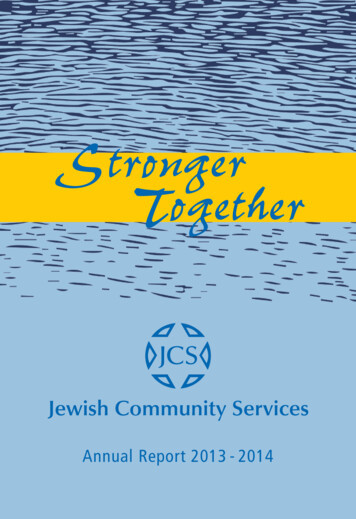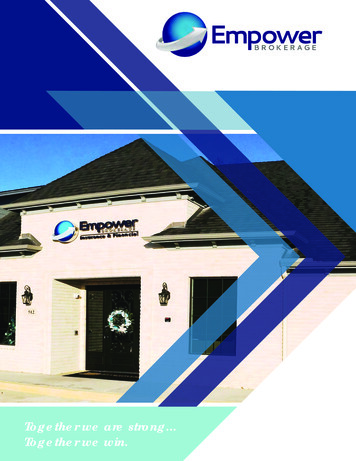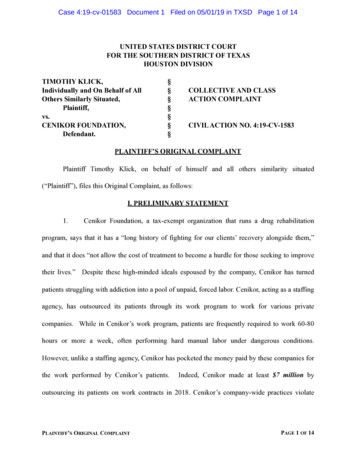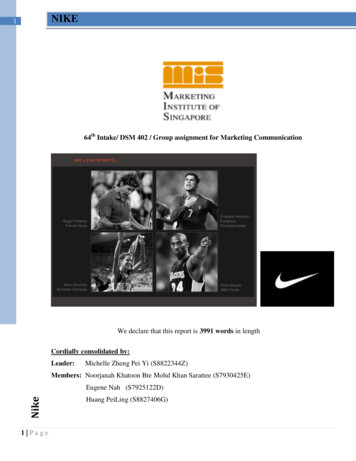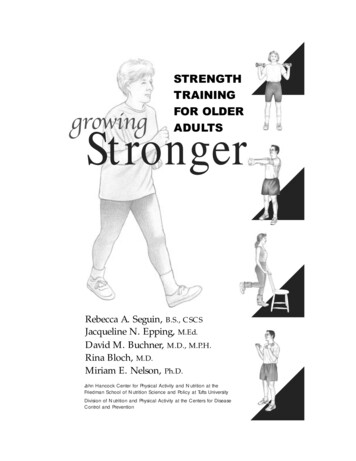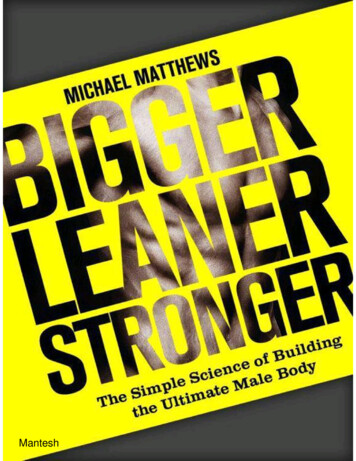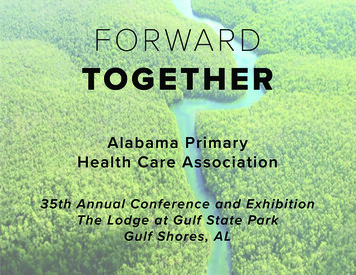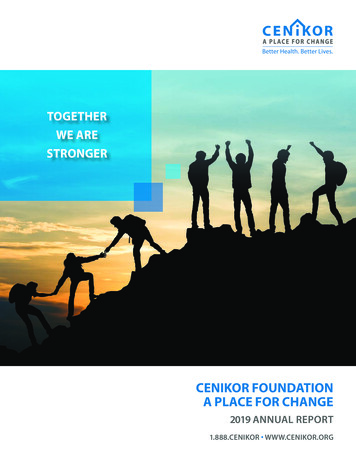
Transcription
TOGETHERWE ARESTRONGERCENIKOR FOUNDATIONA PLACE FOR CHANGE2019 ANNUAL REPORT1.888.CENIKOR WWW.CENIKOR.ORG
TABLEOF CONTENTSLetter from the President04Letter from the Board Chair05Leadership06Together We Are Stronger07Client Testimonial, Sean C.11Client Testimonial, James L.12Client Testimonial, Candice C.13Client Testimonial, Tamara H.14Program Demographics15Full Continuum of Care16Program Outcomes18Financial Information19Supporters20Messages21Locations Served22
CENIKORFOUNDATIONWe are committed to helping people withsubstance use disorders and behavioral healthissues through our full continuum of care. Weoffer a variety of programs throughout Texas andLouisiana including Detox, Short-Term Residential,Long-Term Residential, Adolescent Residential,Outpatient Detox, Adult Outpatient, AdolescentOutpatient, Medication-Assisted Treatment, SoberLiving and Prevention services.Our focus is to provide high-quality, affordableservices to the clients and the communities weproudly serve. Cenikor is a 501(c)(3) nonprofitorganization, proudly serving over 1,000 clientseach week to achieve better health andbetter lives.MISSIONCenikor. A Place for Change.Providing a Foundation for Better Health and Better Lives.VISIONCenikor will be a leader in providing quality behavioralhealth care services in the communities we serve througha continuum of care for adults and adolescents.CORE VALUES Health and ility
LETTER FROMTHE PRESIDENTI absolutely believe that together we are stronger. To me that meansfamily. I think about Cenikor’s family of services—a continuum of care thathelps our clients wherever they need us. I also think of our family ofprofessionals, all whom have a heart for recovery. Addiction is chaotic, butour employees gladly walk alongside our clients on their paths to betterhealth and better lives.In our programs, our clients find great peace when they begin to experiencehealing in their families, and they draw great strength from their family ofchoice, their Cenikor family.President/CEOBill BaileyI was recently asked by a legislator how I came to Cenikor. He was surprisedby my response: “God dreams much bigger than I dream.” Two things areimportant to me: my family and my faith. Years ago I was successful in avery secure career when a recruiter called and continued to do so for fourweeks. He was working to convince me to trade my comfortable positionfor a struggling drug rehab program.One of my core beliefs is that God isn’t concerned about my comfort. Godis concerned about my character. It’s my responsibility to be obedientto God’s call. I prayed about this opportunity, found peace and have neverlooked back. God loves Cenikor. Things have often looked challenging,yet the next day we were bigger and stronger than ever.Last year, Cenikor served almost 9,000 people (2,205 clients identifiedopioids as their primary addiction). Our therapeutic community wasestablished 53 years ago to help people with heroin dependence. Todaywe’re using some of the same principles with newer evidence-basedpractices, because long-term recovery is still the best approach to dealingwith long-term addiction.None of this would be possible without our family of professional, clinicaland support staff and volunteer board. We are blessed to have a passionate,committed and phenomenal board of directors. Each of them believes thatwhat we do saves lives, and we appreciate their unwavering leadership.Thank you for your continued support because together, we are stronger!Bill Bailey, President/CEO41.888.CENIKOR WWW.CENIKOR.ORGCENIKOR ANNUAL REPORT 2019
LETTER FROMTHE CHAIR“We are stronger together than we are alone.” — Walter PaytonOn behalf of Cenikor Foundation’s National Board of Directors, it is a privilegeto present this annual report, “Join the Voices for Recovery: Together WeAre Stronger.”Cenikor Foundation is a leader in the national conversation about recovery.Mental and substance use disorders don’t come from outside our individualcommunities. They are part of our communities! We all must all take a rolein addressing these difficult issues. Together, we are stronger as families, astreatment centers, as communities and as a foundation.Board ChairAbelino “Abel” Reyna, J.D.At Cenikor, the last year has been one of continued growth. We have solidifiedour services in areas where they are needed, both clinically and geographically.I’m proud of the strengths Cenikor brings to the table: financial stability,evidence-based curricula and a treatment model that includes a comprehensiveand wide-ranging continuum of care. But we can always be better.An often overlooked strength is our willingness to self-evaluate. Within ourexisting framework, we ask ourselves what we do skillfully and what we canimprove upon. In everything we do, whether it’s expanding services or dealingwith adversity, we maintain focus on our mission. We keep doing what we dobecause it helps families, and most of all individuals.Of course none of this happens without each member of the Cenikor family.Every person in the organization is vital to the work we do, from the CEO andexecutive team to each clinical and support team member. We also rely onour communities, including business partners and donors. Everyone makes adifference. We must all work together to provide current and future clients withthe tools they need to overcome addiction and any underlying issues. I’mproud that Cenikor is at the forefront of this very important movement.Board members are part of this work. I would put our Board of Directors upagainst any other—profit or non-profit. I’m in awe of each member’s visionand empathy for Cenikor’s mission. They serve with purpose and have a deepunderstanding of the impact of addiction. I am honored to serve alongside them.Godspeed to all who walk along this journey.Abelino “Abel” Reyna, J.D. , Board ChairCENIKOR ANNUAL REPORT 20191.888.CENIKOR WWW.CENIKOR.ORG5
LEADERSHIPEXECUTIVE LEADERSHIPBill Bailey - President/CEOMatt Kuhlman, CPA - Vice President/CFOKellee Webb, SPHR - Vice President/CHROAmy Granberry - Vice President, ClientEngagement & Recovery ManagementAngel Hull, Ph.D., MSSW, MBA PMP Assistant Vice President of Clinical ServicesEugene Hall, Jr. - Senior Regional DirectorEric Jeter - Senior Regional DirectorCORPORATE MANAGEMENTDarren Tompkins - Director of DevelopmentRune Christensen - Director of ITHeather Robertson, LMSW - Director ofUtilization Review & CQ EffectivenessMonique Krolak - Director of TrainingJoseph Whitaker, RN - Director of NursingTequila Henderson - Senior Manager ofRevenue Integrity & ComplianceKent Olsan - Senior Director, Revenue CycleGary Hoover, MSML, SHRM-SCP - Directorof HRBOARDSNATIONAL BOARDOF DIRECTORSAMARILLO, TXDetox/Short-term Residential/CareCounseling ServicesMelisa Martinez, LMSW Program DirectorLong-Term ResidentialElishia Hoots, LCDC - Senior ManagerAUSTIN, TXDetox/Short-term ResidentialRaul Garcia, LMSW, LCDC Facility DirectorCORPUS CHRISTI, TXLong-term Residential/Care CounselingServicesCourtney Schroeder - Facility DirectorDetox/Short-Term ResidentialDebra Townzen, LCDC - Program DirectorFORT WORTH, TXLong-term ResidentialDon Goad, LCDC - Senior DirectorKimberly Reaves - Senior ManagerHOUSTON, TXLong-term ResidentialSteven Reeves, LCDC - Senior ManagerDwayne Parr - Senior Business ManagerSAN MARCOS, TXPrevention Services/ CareCounseling ServicesCarla Merritt, LMSW, LCDC, CPS -Senior ManagerTYLER, TXDetox/Short-term Residential/ CareCounseling ServicesKeisha Morris, LCDC - Senior ManagerWACO, TXDetox/Short-term ResidentialCare Counseling ServicesStacie Woodall, MCJ, LCDC Facility DirectorBATON ROUGE, LALong-term Residential/Outpatient ServicesDavid Lee, Ph.D. - Senior DirectorMichael Dougherty - SeniorBusiness ManagerDetox/Short-term ResidentialScott Shaheen - Program DirectorDetox/Short-term ResidentialMichael Brochstein, LCDC, ADC Senior ManagerEMERITUSBruce LaBoon, J.D.Abelino “Abel” Reyna, J.D. -Board ChairADVISORY BOARDSWillie Mount - Past ChairAUSTIN, TXWilliam Ferguson Chad CantellaBoard SecretaryKama HarrisWilliam “Rick” Grinnan, Jr. Board TreasurerCORPUS CHRISTI, TXBill Bailey - CenikorJeff KanePresident/CEOAmy GriffinAlex Howard, CFA, ASADr. Jacqueline PhillipsBentley SanfordDaniel NashBruce LaBoon, J.D.Lenard NelsonGeoff CrabtreeChris CarrollLarry HobbsBob AllenMichael D. Viator, CPAHenry WilliamsO. Duane Gaither IIFORT WORTH, TXRalph HawkinsMimi CoffeyRick Fountain, J.D.Stephen GebrenJohn MarmadukeScott JonesChris NicosiaRoss TaylorJoy Schmitz, Ph.D.6Odyssey House - AdolescentResidential/ Adolescent OutpatientDerrick Lott, LCDC - Facility DirectorHOUSTON, TXVanessa Ayala de MedinaTanner BaileyKelty BakerDavid BerrierAndy StewartWarren BrooksTony UrrutiaBrian DaigleDavid HarrellSherrie JohnsonHoward BushartBill PattersonCayman TiradoODYSSEY HOUSEHOUSTONMike ViatorMarianne MarcusAndrew HamleyDeidra CarrollAlex HowardTYLER, TXTony RandEric BroughtonDr. Dorothy JacksonJimmy TolerRicky GarnerRoss WorleyDavid LongDebra WyattBrittney NicholsPaula DavisKristi RobertsPrentice ButlerLindsey LittleJohn JohnsonDan HoschBATON ROUGE, LADr. Susan ThorntonPatril YoungAlison WalkerMiles WilliamsDianne AndrewsTreasure WhiteChris NicholsWACO, TXDr. David PoolerKattina BryantJacky ClaytonDr. Lance KelleyLilly EttingerTeri HoltkampTom ThomasGordon Harriman1.888.CENIKOR WWW.CENIKOR.ORGCENIKOR ANNUAL REPORT 2019
JOIN THE VOICESFOR RECOVERY:TOGETHER WE ARESTRONGER.Have you ever tried to face a difficult challenge alone? It’s liketrying to push a huge boulder uphill. You make progress, butwhen you stop to rest or take your mind off your top of thehill goal, it comes sliding down again. You must regain the lostdistance. Or you might need to start over.Now imagine asking just one person to help, perhaps to holdthe boulder while you rest. Or perhaps you ask a couple ofpeople or a team of people. You begin to feel supported,see yourself and your progress with new eyes, and with helpeventually reach the summit.Day after day, year after year, Cenikor Foundation—and all thepeople and programs that make it a family—helps one personafter another address that boulder called addiction.“Addiction takes many forms,” says Bill Bailey, President andCEO of Cenikor Foundation. “It doesn’t matter if a person startsdrinking or using drugs at an early age and can’t stop or if heor she self-medicates with drugs or alcohol to mask behavioralor mental health issues. That person’s problem affects all of us,and we must all be part of the solution.”Cenikor believes we are stronger when we work together.Our executive team and professional and clinical staff rely ona plethora of committed community members: families, boardmembers, business partners, referral sources, faith-basedorganizations, 12-step programs, donors and volunteers.CENIKOR ANNUAL REPORT 20191.888.CENIKOR WWW.CENIKOR.ORGThe need is great. Consider these numbers fromthe Substance Abuse and Mental Health ServicesAdministration’s most recent U.S. survey in 2017.19.7 millionadults had a substance use disorder; 8.5 millionof them had a co-occurring mental illness11.4 millionpeople aged 12 and overmisused opioids774,000people aged 12 and over usedmethamphetamines in the past month16.7 millionpeople aged 12 and over reported heavyalcohol use in the past month50%of the adults with co-occurring mental illnessand substance use disorder received no services10th leading causeof death remained suicide7
Cenikor’s executive team and board memberscontinuously ask: How can we be moreeffective? How can we reach more people?Over the past year, as you’ll read in this report,there were many answers. In addition toon-going evaluations of all programs—fromprevention through detox through soberliving—new programs were brought into thefamily of services.Cenikor has opened two new long-term residential programsthis year. Veterans services have been expanded to includeall locations and levels of care serving at least 30 veteransper day. In San Marcos, a Youth Recovery program works withhigh school and college students. Cenikor Amarillo is growingits short-term residential program, adding a long-termresidential program and creating opportunities for peoplein homeless shelters, a collaboration that began with ARAD(Amarillo Recovery from Alcohol and Drugs).In the last year, Corpus Christi joined the Cenikor family,offering medically-assisted detox, short-term residential andintensive outpatient services. New this year is the long-termresidential program with 40 beds, soon to expand to 100.Facility Director Courtney Schroeder calls the expansion “apassion project.“8Short stay is long enough to plant a seed for recovery.Long term is long enough to address and confront underlyingproblems, triggers, behaviors and patterns. The therapeuticcommunity is honest and raw. Peers recognize and point outissues. It’s beautiful to watch.“This modality wasn’t available in the area. Now we have aprogram that’s more realistic for a lasting solution. Hidingsomething for 30 days may be easy. Hiding something for18 months, not so much. It’s absolutely serving a need in thecommunity. Before, we could refer to other Cenikor long-termprograms, but now we’re offering a full continuum of care inSouth Texas.”Just as the new location adopted long-term residential carefrom Cenikor, staff there shared its experience of workingwith veterans and a program that has now expanded toall locations. The Foundation is proud to be a part of theTriWest Healthcare Alliance network allowing us to providecommunity-based care to veterans.Veterans who meet certain criteria can take advantage ofsubstance use disorder services at every level. “We are fillingthe gap where there is a need for substance use disorder andmental health services,” Courtney says.1.888.CENIKOR WWW.CENIKOR.ORGCENIKOR ANNUAL REPORT 2019
“Veterans have given so much to our country. This is a smallway we help them navigate the next phase of their lives. Someof them haven’t been able to talk about their experiences. Weprovide them a safe environment and a high quality of care.”In Waco, Wendell Carey, LCDC, says veterans appreciate theprogram’s structure. Their military training has taught thempatience and tolerance.Don Goad, LCDC, Senior Director for FortWorth and Amarillo, says the Amarillocommunity identifies substance use as itsmain issue of concern. “We can help with that,”he says. “Our programs there are complete –a one-stop shop for all services.”Many of the vets he sees have co-occurring mental healthand substance use issues. Cenikor Waco addresses both.“You can’t address your core issues if you’re drunk or on drugs,which is where I am able to help, providing substance usedisorder treatment services,” Wendell says. “Substance usesuppresses the issues that are causing problems. Residentialtreatment helps clients get to the core issues of why they’reself-medicating, why they’re running.”One innovative program brought to Cenikor began withAmarillo Recovery from Alcohol and Drugs and a partnershipwith the city. In this program, Cenikor provides free servicesto clients of area homeless shelters. Each morning, Cenikorvisits the shelters to pick up anyone with substance use issues.Throughout the day, participants receive the full gamut ofoutpatient services, including clinical process groups, life skillsand wellness classes and 12-step programs. They return to theshelters in the evenings.For Wendell, the program is about giving back. “I’m workingwith people whose lives are at stake. Guiding them makesme a better person. I’ve seen 60- or 70-year-old men comein feeling they’re at the end. It’s all over. Then they leave withhope, standing tall, well groomed, with light in their eyes.“This program can make all the difference in the world to thehomeless,” Don says. “If they can get past substance use andtake advantage of other programs offered in the shelters, itcan be life changing. Substance use is often the core issuebehind homelessness and the inability to hold a job.”“It’s an honor and privilege to work with these guys.”Melisa Martinez, LMSW, serves as Program Director forshort-term residential in Amarillo and says she is seeingreferrals from intensive outpatient and other outpatientgroups throughout the Texas Panhandle. “We’re the only detoxand short-term residential program within a five-hour driveand we’re happy to serve such a large community.”VETERANS HAVE GIVENSO MUCH TO OUR COUNTRY.THIS IS A SMALL WAY WE HELPTHEM NAVIGATE THE NEXTPHASE OF THEIR LIVES. 2019 2019 1.888.CENIKOR ORT9
Referrals also come from mental health hospitals becausethe program works with dual diagnosis clients. Growth isinevitable. Currently at 36 beds, Cenikor is in the process ofexpanding and adding additional beds.“Building rapport is key,” Melisa says. “Clients want to knowthey aren’t alone. For me, making a difference in someone’slife, even if it’s just one person, is worth it.”OUR CLIENTS ARE STRONGER WHEN THEYGATHER IN COMMUNITY,WHEN THEY DRAW STRENGTH FROMTHEIR CENIKOR FAMILY.Cenikor Amarillo has also added long-term residentialtreatment. Half of the clients are self-referred with a varietyof referral sources making up the remainder. The individualclient’s goal and needs determine their length of stay andcompletion of the program.“In long-term programs, community is the change agent.Clients hold each other accountable,” Don says.The program is off the ground with 13 clients and additionalplans for expansion.Other efforts are aimed at reaching youngpeople before they become addicted orbefore addiction becomes a way of life.Cenikor San Marcos has well-established prevention andintensive outpatient programs. Newer to the family of servicesis its Youth Recovery Community (YRC). Staff members workwith students at Texas State University and area high schoolsto help them gain or maintain sobriety. A state-funded grantcovers programs for students ages 13 to 21. The growingprogram is hiring additional peer recovery leaders and a familycoordinator to extend its reach into additional high schools.Elyse Greenamyre, RSPS, LCDC-I, the YRC Team Lead, says theprogram has three main components. Students aren’t givenan agenda. Instead they are asked, “How can we help youestablish goals? How can we help in general?”The first component is individual peer recovery. Staffmembers draw upon their own lived experiences to helpyouth understand why they are using. Second are supportgroups. Leaders encourage participants to think long term anddetermine what they need to address — triggers or copingskills, for instance. And third are fun and sober experiences.“Trying to maintain sobriety on a college campus can beisolating,” Elyse explains. “We help students seek out novelexperiences in a safe way. We help them re-wire the brain tolearn they can have fun while sober. At Texas State, weplan gatherings for paintball, bowling, movies, Friendsgivingdinners and sober tailgate parties. We meet at coffee shopsfor students to study and be in community. “Partying isnormalized, especially on college campuses. But that’schanging. Recovery is becoming part of the vernacular.10The national conversation is shifting away from viewingaddiction as a moral failure.” Elyse, who is four years into her personal recovery, says it’srewarding to have these conversations with students. “Greatthings are out there for those who persist. We can be the voiceof hope for others.”Together we are stronger.That is the voice of hope.Our clients are stronger when they gather in communityand draw strength from their Cenikor family. And Cenikor isstronger because of all the people and organizations that jointheir voices in this vital field of recovery. Whether it’s highschools and colleges that invite us onto their campuses topromote a sober lifestyle or cities like Amarillo that recognizesubstance use as a major concern and
cenikor foundation . a place for change. 2019 annual report. together we are . stronger. 1.888.cenikor www.cenikor.org
